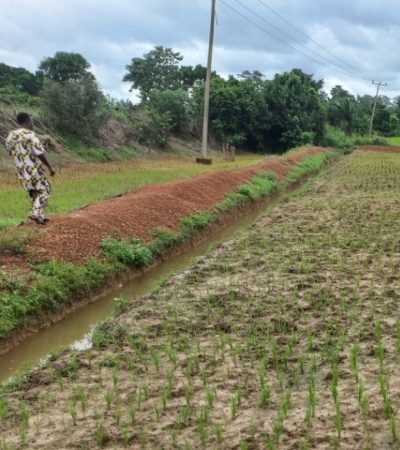Fish farmers in parts of Indonesia are sometimes left fishing for answers when they have questions regarding their work, and delays in responses can be costly. But with support from the U.S. Agency for International Development (USAID) as part of the Feed theFuture initiative, access to an informational database or live help from an expert is now at their fingertips.
Teaming up with an Indonesian startup company, 8Villages, USAID has helped launch AquaFIS – the Aqua Farmer Information System. The mobile phone service helps small-scale fish and shrimp farmers access real-time data through SMS, Android applications or online forums.
“I belong to a farmers’ group, but rarely attend meetings or discussions because I do not feel comfortable since the other members are about my father’s age,” says Ahmad Ansori, a 24-year-old farmer from Banyuwangi, Indonesia. “I usually rely on the internet to get information on shrimp farming. I am happy to know that now there are mobile-extension services.”
As aquaculture becomes more widespread, with an estimated 80 percent of production coming from family-run operations, there is a growing need for timely industry information that leads to better production practices, higher prices and improved product quality. But among smallholder farmers who live in remote areas, it is common to have to wait days for assistance or to have difficulty quickly accessing the information they need at a critical and time-sensitive decision point. Sometimes, extension service agents are so specialized that they have a limited ability to advise outside their areas of expertise.
AquaFIS addresses these challenges and helps close the growing disparity in knowledge and skills, empowering farmers in rural Indonesia so that they no longer need to rely strictly on experts and extension agents who normally provide training and consultations through community visits. The system has already garnered nearly 400 users in East Java Province since its launch in September 2014.
Using mobile technology to help farmers has been a popular practice in agriculture, but this is the first time it is being used for aquaculture. With just a few pushes of a button on their phone, farmers can find out when and how much to feed their fish, which type of feed to use for a particular species, how to treat disease or any other questions they may have when face-to-face consultation or training is unavailable.
“The improvement of rice farming practices have led to production increases in excess of 50 percent,” says 8Villages General Manager Anita Hesti. “Their buyer/seller networks have expanded and they also have increased access to finance. Given these successes, it seemed natural to seek out opportunities in other agricultural areas, including aquaculture. We are excited to initiate this pilot in partnership with USAID and several Indonesian academic institutions.”
USAID promotes more sustainable and efficient use of aquaculture and fishery resources in the Association of Southeast Asian Nations (ASEAN) region where fish and fishery products are significant sources of food and income. Given that the current volume of ocean harvest cannot be increased without dramatic, negative consequences for the environment and the region’s economy, aquaculture plays a key role in long-term food security – particularly in Asia wherediets include proportionally more fish than other regions of the world.
8villages plans to expand the mobile extension services to other parts of Indonesia and other ASEAN countries. Eventually, the platform will create a network between aquaculture farmers across ASEAN and the multiple players in the aquaculture value chain including local fishing companies, input suppliers, buyer and producer organizations and microfinance institutions. The platform will also have the potential to advance the sustainable management of the aquaculture ecosystem and the aquaculture industry.




